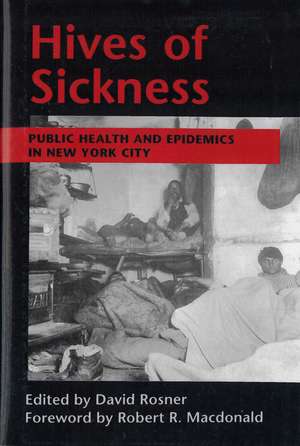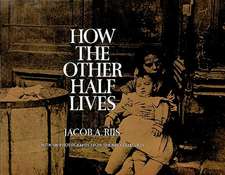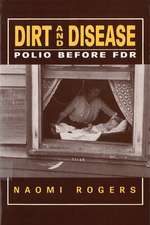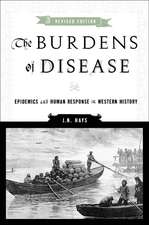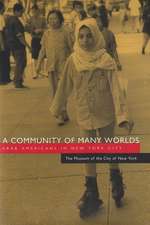Hives of Sickness: Public Health and Epidemics in New York City
Editat de Professor David Rosneren Limba Engleză Hardback – mar 1995
An 1865 report on public health in New York painted a grim picture of "high brick blocks and closely-packed houses . . . literally hives of sickness" propagating epidemics of cholera, smallpox, typhoid, typhus, and yellow fever, which swept through the whole city. In this stimulating collection of essays, nine historians of American medicine explore New York's responses to its public health crises from colonial times to the present. The essays illustrate the relationship between the disease environment of New York and changes in housing, population, social conditions, and the success of medical science, linking such factors to New York's experiences with smallpox, polio, and AIDS.
The volume is essential reading for anyone interested in American public health and the social history of New York.
The contributors are Ronald Bayer, Elizabeth Blackmar, Gretchen A. Condran, Elizabeth Fee, Daniel M. Fox, Evelynn M. Hammonds, Alan M. Kraut, Judith Walzer Leavitt, and Naomi Rogers. David Rosner is a professor of history at Baruch College and The Graduate School of the City University of New York. Robert R. Macdonald is the director of the Museum of the City of New York.
A publication of the Museum of the City of New York
Choice Reviews 1995 NovemberThis is one of a series of books focusing on the impact of disease intended to enhance the understanding of both past and present regarding reactions to periodic epidemics. Robert B. Macdonald, director of the Museum of the City of New York, which supports this series, states: "The individual and collective responses to widespread sickness are mirrors to the cultural, religious, economic, political, and social histories of cities and nations." Rosner selected eight renowned and respected individuals to describe the reactions and responses to smallpox, polio, and AIDS epidemics in New York City since 1860, and the efforts of officials and professionals to deal with the impact of disease. Essayists present disease broadly from economic, social, political, and health perspectives. Causes of epidemics include the expected and usual: thousands of immigrants pouring into the city, inadequate water and food supplies, lack of sewage disposal, unemployment leading to poverty. An unexpected cause was the avarice of real estate investors, inexorably driving up housing costs.
Highly recommended for all students of history, public health, health policy, and sociology. Upper-division undergraduate through professional. Copyright 1999 American Library Association
The volume is essential reading for anyone interested in American public health and the social history of New York.
The contributors are Ronald Bayer, Elizabeth Blackmar, Gretchen A. Condran, Elizabeth Fee, Daniel M. Fox, Evelynn M. Hammonds, Alan M. Kraut, Judith Walzer Leavitt, and Naomi Rogers. David Rosner is a professor of history at Baruch College and The Graduate School of the City University of New York. Robert R. Macdonald is the director of the Museum of the City of New York.
A publication of the Museum of the City of New York
Choice Reviews 1995 November
Highly recommended for all students of history, public health, health policy, and sociology. Upper-division undergraduate through professional. Copyright 1999 American Library Association
Preț: 360.49 lei
Preț vechi: 379.46 lei
-5% Nou
Puncte Express: 541
Preț estimativ în valută:
68.99€ • 71.76$ • 56.95£
68.99€ • 71.76$ • 56.95£
Carte tipărită la comandă
Livrare economică 14-28 aprilie
Preluare comenzi: 021 569.72.76
Specificații
ISBN-13: 9780813521589
ISBN-10: 0813521580
Pagini: 223
Ilustrații: 1
Dimensiuni: 150 x 250 x 25 mm
Greutate: 0.57 kg
Ediția:None
Editura: Rutgers University Press
Colecția Rutgers University Press
ISBN-10: 0813521580
Pagini: 223
Ilustrații: 1
Dimensiuni: 150 x 250 x 25 mm
Greutate: 0.57 kg
Ediția:None
Editura: Rutgers University Press
Colecția Rutgers University Press
Cuprins
Foreword
Robert R. Macdonald
Introduction: ``Hives of Sickness and Vice''
David Rosner
PART I Breeding Grounds for Disease
Changing Patterns of Epidemic Disease in New York City
Gretchen A. Condran
Accountability for Public Health: Regulating the Housing Market in Nineteenth-Century New York City
Elizabeth Blackmar
Plagues and Prejudice: Nativism's Construction of Disease in Nineteenth-and Twentieth-Century New York City
Alan M. Kraut
PART II When Epidemic Strikes
"Be Safe. Be Sure. '': New York City's Experience with Epidemic Smallpox
Judith Walzer Leavitt
A Disease of Cleanliness: Polio in New York City, 1900--1990
Naomi Rogers
The Dependent Center: The First Decade of the AIDS Epidemic in New York City
Ronald Bayer
PART III The City Responds
Science, Politics, and the Art of Persuasion: Promoting the New Scientific Medicine in New York City
Elizabeth Fee
Evelynn M. Hammonds
The Politics of Public Health in the New York City: Contrasting Styles Since 1920
Daniel M. Fox
Notes on Contributors
Index
Robert R. Macdonald
Introduction: ``Hives of Sickness and Vice''
David Rosner
PART I Breeding Grounds for Disease
Changing Patterns of Epidemic Disease in New York City
Gretchen A. Condran
Accountability for Public Health: Regulating the Housing Market in Nineteenth-Century New York City
Elizabeth Blackmar
Plagues and Prejudice: Nativism's Construction of Disease in Nineteenth-and Twentieth-Century New York City
Alan M. Kraut
PART II When Epidemic Strikes
"Be Safe. Be Sure. '': New York City's Experience with Epidemic Smallpox
Judith Walzer Leavitt
A Disease of Cleanliness: Polio in New York City, 1900--1990
Naomi Rogers
The Dependent Center: The First Decade of the AIDS Epidemic in New York City
Ronald Bayer
PART III The City Responds
Science, Politics, and the Art of Persuasion: Promoting the New Scientific Medicine in New York City
Elizabeth Fee
Evelynn M. Hammonds
The Politics of Public Health in the New York City: Contrasting Styles Since 1920
Daniel M. Fox
Notes on Contributors
Index
Descriere
An 1865 report on public health in New York painted a grim picture of "high brick blocks and closely-packed houses . . . literally hives of sickness" propagating epidemics of cholera, smallpox, typhoid, typhus, and yellow fever, which swept through the whole city. In this stimulating collection of essays, nine historians of American medicine explore New York's responses to its public health crises from colonial times to the present. The essays illustrate the relationship between the disease environment of New York and changes in housing, population, social conditions, and the success of medical science, linking such factors to New York's experiences with smallpox, polio, and AIDS. The volume is essential reading for anyone interested in American public health and the social history of New York. The contributors are Ronald Bayer, Elizabeth Blackmar, Gretchen A. Condran, Elizabeth Fee, Daniel M. Fox, Evelynn M. Hammonds, Alan M. Kraut, Judith Walzer Leavitt, and Naomi Rogers. David Rosner is a professor of history at Baruch College and The Graduate School of the City University of New York. Robert R. Macdonald is the director of the Museum of the City of New York.
